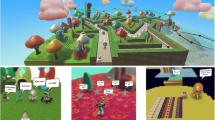Abstract
Arithmetic is a fundamental component of mathematics education that forms the basis for many other disciplines, including science, engineering, and finance. However, for many schoolchildren, learning arithmetic can be a difficult and often tedious task. Traditional methods of teaching arithmetic, such as rote memorization and repetitive practice, may not always be effective in engaging pupils and promoting a deep understanding of the material.
To address these challenges, educators have explored alternative methods of teaching arithmetic that can engage pupils and promote a deeper understanding of the subject. A promising approach is the use of digital games.
The objective of this research paper is to create a digital game in the form of a “Game & learn” web application that can be used to teach arithmetic to primary school children, the application is accessible via a web browser and includes a user-friendly interface suitable for children aged 6 to 11. Our game use interactive challenges and feedback to help children learn at their own pace and track their progress.
Access this chapter
Tax calculation will be finalised at checkout
Purchases are for personal use only
Similar content being viewed by others
References
Alt, D.: Assessing the benefits of gamification in mathematics for student gameful experience and gaming motivation. Comput. Educ. 200, 104806 (2023)
Videnovik, M., Bogdanova, A.M., Trajkovik, V.: Game-based learning approach in computer science in primary education: a systematic review. Entertain. Comput., 100616 (2023)
Zheng, Y., et al.: Effects of digital game-based learning on students’ digital etiquette literacy, learning motivations, and engagement. Heliyon 10(1) (2024)
Acquah, E.O., Katz, H.T.: Digital game-based L2 learning outcomes for primary through high-school students: a systematic literature review. Comput. Educ. 143, 103667 (2020)
Brezovszky, B., et al.: Effects of a mathematics game-based learning environment on primary school students’ adaptive number knowledge. Comput. Educ. 128, 63–74 (2019)
Cherry, K.: Piaget’s 4 stages of cognitive development explained (2018)
Latif, S.: What Is Cognitive Development? 3 Psychology Theories. PositivePsychology.com (2023). https://positivepsychology.com/cognitive-development/
Cht, A.B.P.D.: What is cognitive development & why is it important? Verywell health (2022)
Kubat, U.: Identifying the individual differences among students during learning and teaching process by science teachers. Int. J. Res. Educ. Sci. 4(1), 30–38 (2018)
Liu, Y., Ng, J.T.D., Hu, X., Ma, Z., Lai, X.: Adopt or abandon: facilitators and barriers of in-service teachers’ integration of game learning analytics in K–12 classrooms? Comput. Educ. 209, 104951 (2024)
Tapingkae, P., Panjaburee, P., Hwang, G.J., Srisawasdi, N.: Effects of a formative assessment-based contextual gaming approach on students’ digital citizenship behaviours, learning motivations, and perceptions. Comput. Educ. 159, 103998 (2020)
Author information
Authors and Affiliations
Corresponding author
Editor information
Editors and Affiliations
Rights and permissions
Copyright information
© 2024 The Author(s), under exclusive license to Springer Nature Switzerland AG
About this paper
Cite this paper
Boussaha, K., Rahab, A., Khelifi Touhami, K., Boudraa, C.E.A.T. (2024). Adoption of Digital Games as Pedagogical Aids for Teachers and Pupils in Primary Schools to Overcome Learning Problems in Arithmetic. In: Sifaleras, A., Lin, F. (eds) Generative Intelligence and Intelligent Tutoring Systems. ITS 2024. Lecture Notes in Computer Science, vol 14799. Springer, Cham. https://doi.org/10.1007/978-3-031-63031-6_8
Download citation
DOI: https://doi.org/10.1007/978-3-031-63031-6_8
Published:
Publisher Name: Springer, Cham
Print ISBN: 978-3-031-63030-9
Online ISBN: 978-3-031-63031-6
eBook Packages: Computer ScienceComputer Science (R0)




